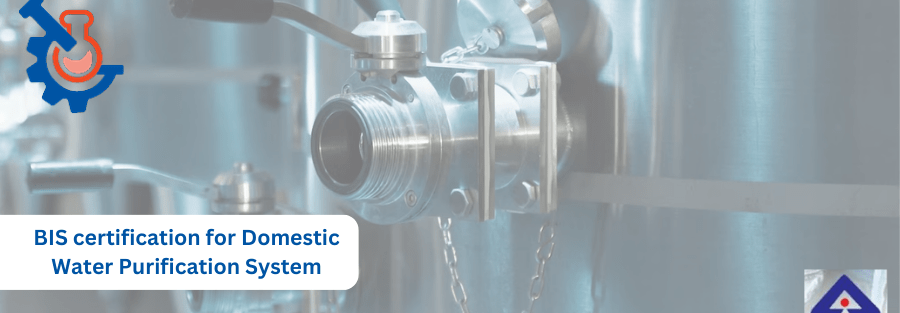BIS certification is a mandatory requirement for domestic water purification systems in India. BIS stands for Bureau of Indian Standards, which is the national standards body of India. BIS certification ensures that the water purification system meets the prescribed quality and safety standards set by the Indian government.
The certification process involves testing the water purification system for various parameters such as purification capacity, the effectiveness of purification, removal of impurities and harmful substances, and durability of the product. The testing is done in accredited BIS laboratories.
Once the product passes the testing, a BIS certification is issued to the manufacturer, which signifies that the product meets the necessary quality and safety standards.
The BIS certification is valid for two years, after which the product needs to be retested and recertified.
Manufacturers need to obtain BIS certification for domestic water purification systems as it is a legal requirement in India. Moreover, it assures consumers that the product they are buying meets the necessary quality and safety standards.
BIS CERTIFICATION FOR REVERSE OSMOSIS (RO)
BIS certification is mandatory for Reverse Osmosis (RO) based Point-of-Use (POU) water treatment systems in India as per IS 16240:2015. This standard specifies the requirements for RO-based POU water treatment systems, which are used for purifying drinking water at the point of use in households and small establishments.
The BIS certification process for RO-based POU water treatment systems involves testing the product for various parameters such as purification capacity, removal of impurities, the effectiveness of purification, and durability.
The testing is done in accredited BIS laboratories as per the requirements of IS 16240:2015.
Manufacturers need to submit their products for testing to a BIS-approved laboratory along with the necessary documents such as technical specifications, test reports, and manufacturing details. The product is then tested as per the prescribed standards, and if it meets the requirements, a BIS certification is issued to the manufacturer.
The BIS certification is valid for two years, after which the product needs to be retested and recertified. Manufacturers need to obtain BIS certification for RO-based POU water treatment systems as it is a legal requirement in India. Moreover, it assures consumers that the product they are buying meets the necessary quality and safety standards.
Role of BIS in ensuring safe drinking water.
The Bureau of Indian Standards (BIS) plays a crucial role in ensuring the safety and quality of drinking water in India. BIS is the national standards body of India and is responsible for developing and promoting standards in various sectors, including water treatment and supply.
BIS develops and updates standards for various types of water treatment systems, such as domestic water purification systems, RO-based POU water treatment systems, UV-based systems, activated carbon filters, ceramic filters, and water softeners. These standards specify the requirements that these systems need to meet to ensure the safety and quality of drinking water.
BIS also provides certification services for these water treatment systems to ensure that they meet the prescribed standards. Manufacturers need to submit their products for testing to a BIS-approved laboratory and meet the requirements of the relevant Indian Standard.
If the product meets the requirements, a BIS certification is issued to the manufacturer.
BIS also collaborates with other government agencies and stakeholders to promote the adoption of its standards and ensure their effective implementation. For example, BIS works closely with the Ministry of Drinking Water and Sanitation to promote the use of BIS-certified water treatment systems in rural areas.
In addition to developing and promoting standards, BIS also conducts research and development activities to improve the safety and quality of drinking water in India.
BIS has established a state-of-the-art water testing laboratory in Delhi that can test water samples for various parameters such as pH, turbidity, hardness, fluoride, and arsenic.
Overall, the role of BIS in ensuring safe drinking water in India is critical, and its efforts have contributed significantly to improving the quality of drinking water in the country.
BIS certification for other types of water treatment systems.
BIS certification is required for various types of water treatment systems in India, apart from domestic water purification systems and RO-based POU water treatment systems. Here are some examples:
UV-based water purification systems: UV-based water purification systems use ultraviolet radiation to disinfect water and remove harmful microorganisms. BIS certification is required for these systems under the Indian Standard IS 14724.
Activated carbon filters: Activated carbon filters are used to remove chlorine, sediment, and other impurities from water. BIS certification is required for these filters under the Indian Standard IS 14743.
Ceramic filters: Ceramic filters are used to remove bacteria, protozoa, and other impurities from water. BIS certification is required for these filters under the Indian Standard IS 11755.
Water softeners: Water softeners are used to remove hardness-causing minerals from water, such as calcium and magnesium. BIS certification is required for these systems under the Indian Standard IS 14724.
The BIS registration process for these systems is similar to that of domestic water purification systems and RO-based POU water treatment systems. Manufacturers need to submit their products for testing to a BIS-approved laboratory and meet the requirements of the relevant Indian Standard.
If the product meets the requirements, a BIS certification is issued to the manufacturer.
Obtaining BIS certification for domestic water purification systems is important as it assures consumers that the product they are buying meets the necessary quality and safety standards. It also helps manufacturers to comply with the legal requirements in India and gain access to the Indian market.
The Process to Apply for BIS for Domestic Water Purification System.
Here are the general steps to apply for BIS certification for a domestic water purification system:
Identify the relevant Indian Standard: The first step is to identify the Indian Standard that applies to your product. For domestic water purification systems, the relevant standard is IS 16240:2015.
Prepare the application: The next step is to prepare the BIS certification application, which includes the following documents:
- Product specification sheet
- Test reports from a BIS-approved laboratory
- Manufacturer’s quality control plan
- Manufacturing process flow chart
- Label design
Apply: The completed application needs to be submitted to the BIS office along with the prescribed fee. The application can be submitted online through the BIS portal or in person at a BIS office.
Product testing: Once the application is received, the product will be tested by a BIS-approved laboratory to ensure that it meets the requirements of the relevant Indian Standard.
Factory inspection: BIS may conduct a factory inspection to verify that the manufacturer has the necessary quality control measures in place to ensure the consistent production of BIS-certified products.
Granting of BIS certification: If the product passes the testing and factory inspection, BIS will issue a BIS certification to the manufacturer. The certification is valid for two years and can be renewed after that.
Use of BIS certification mark: The manufacturer is authorized to use the BIS certification mark on their product, packaging, and advertising material to indicate that the product has been certified by BIS.
It’s important to note that the BIS certification process may differ based on the type of product and the relevant Indian Standard.
Manufacturers are advised to refer to the BIS website for the latest information on the certification process and requirements.
Documents Required
To apply for BIS certification for a domestic water purification system, the following documents are typically required:
Product specification sheet: This document should provide details about the product, including its features, technical specifications, and performance parameters. It should also include details about the materials used and any safety features.
Test reports from a BIS-approved laboratory: The product needs to be tested by a BIS-approved laboratory to ensure that it meets the requirements of the relevant Indian Standard. The test reports should be included in the certification application.
Manufacturer’s quality control plan: This document should describe the quality control measures that the manufacturer has in place to ensure that the product is consistently manufactured to the required standards. The plan should include details about incoming raw materials, in-process quality checks, and final product inspection.
Manufacturing process flow chart: This document should provide a detailed flowchart of the product manufacturing process, including all the steps involved, equipment used, and quality checks performed.
Label design: The label design should comply with the requirements of the relevant Indian Standard and should include all the necessary information about the product, such as the manufacturer’s name and address, product model number, and BIS certification mark.
These are the basic documents required to get BIS certification for a domestic water purification system.
Manufacturers should also be prepared to provide additional information or documents as required by BIS during the certification process.
It’s recommended to refer to the BIS website for the latest information on the certification process and requirements.



